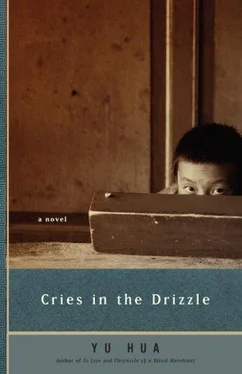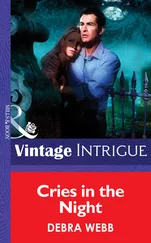Yu Hua
Cries in the Drizzle
Yu Hua was born in 1960 in Zhejiang, China. He finished high school during the Cultural Revolution and worked as a dentist for five years before beginning to write in 1983. He has published four novels, six collections of stories, and three collections of essays. His work has been translated into French, German, Italian, Dutch, Spanish, Japanese, and Korean. In 2002 Yu Hua became the first Chinese writer to win the prestigious James Joyce Foundation Award. His novel To Live was awarded Italy's Premio Grinzane Cavour in 1998, and To Live and Chronicle of a Blood Merchant were named two of the last decade's ten most influential books in China. Yu Hua lives in Beijing.
Allan H. Barr is the translator of a collection of short stories by Yu Hua, and his research on Ming and Qing literature has been published both in the West and in China. He is Professor of Chinese at Pomona College.
Yu Hua established his reputation in the late 1980s through a provocative series of short stories and novellas that placed him at the forefront of the literary avant-garde in China. Cries in the Drizzle , written when Yu Hua was thirty-one, was his first full-length work of fiction, and marked a new phase in his career, one that would soon produce two other memorable novels, To Live and Chronicle of a Blood Merchant. In China, Cries in the Drizzle is perhaps not quite as widely read as Yu Hua's subsequent books, and its international reception has also lagged behind those more popular titles. It is nonetheless a technically accomplished novel that prefigures several themes and situations of Yu Hua's later work. Set largely in provincial Zhejiang in the 1960s and 1970s, the place and time of the author's upbringing, it also comes closer than much of his fiction to his own life experience. With its searing and elegiac vision of childhood and adolescence in the Mao era, Cries in the Drizzle easily holds its own against Yu Hua's other novels, and in the judgment of some critics may even be his finest achievement to date.
When it first appeared in the Shanghai literary journal Shouhuo in 1991, Cries in the Drizzle was entitled Huhan yu xiyu (Cries and drizzle). It was under this title that the book was published in Taipei in the following year, and that is how it is known in Taiwan to this day. In mainland China, however, the novel was soon renamed Zai xiyu zhong huhan (Crying out in the drizzle), in order to avoid confusing it with Ingmar Bergman's film Cries and Whispers , whose Chinese title sounds identical to the novel's original name. The text used in this English translation is that of the 2004 Shanghai reprint, which restores a word excised from early editions of the book.
I am grateful to Yu Hua, Zhang Yongqing, Li Hua, Jane Barr, and Catherine Barr for their advice at various stages. In transcribing Chinese personal names, I have followed the standard pinyin romanization system, with one exception. The name of the narrator's father I render as Kwangtsai rather than the conventional Guangcai, so as to distinguish more clearly the names of his three sons, which are quite different from his in Chinese.
It was in 1965 that nighttime began to stir in me a nameless dread. I am thinking now of that evening when a light rain drifted down. In my bed I lay, a child so little you could have set me there as easily as a toy. The dripping from the eaves simply called attention to the silence that surrounded me, and the steady onset of sleep was but a gradual forgetting of the rain's patter. As I glided peacefully into slumber, it was as though a secluded path had appeared before me, opening a passage between trees and shrubs. Then from far away there came the sound of a woman's anguished wails. When those hoarse cries erupted so suddenly in the still of the night, the boy that I was then shivered and quaked.
I can see myself now, a startled child, eyes wide with fear, the precise outline of my face obscured by the darkness. The woman's cries persisted. Anxiously, I expected to hear another voice, a voice that would respond to her wails, that could assuage her grief, but it never materialized. I realize now why I was gripped by such intense disquiet: it was because I waited in vain for that answering voice. Surely there is nothing more chilling than the sound of inconsolable cries on such a desolate night.
A second memory comes hot on the heels of the first: three or four white lambs trotting across the grass by the riverside, a daytime image, a way of easing the agitation evoked by the previous memory. But I find it hard to decide just where I was when this sight left its mark on me.
Several days may have passed before I seemed to hear a voice that answered the woman's cries. It was late afternoon. A storm had just passed, and dark clouds filled the sky like billows of smoke. I was sitting by the pond behind the house, and out of the damp landscape a man I did not recognize walked toward me. He was dressed completely in black and as he approached his dark clothes waved like a banner under the gloomy sky. When this image began to close in on me it brought to mind the unmistakable sound of the woman's cry. Even from far off in the distance the stranger fixed me with a piercing gaze, and he continued to stare at me as he drew nearer. Just as I was about to panic, he abruptly changed direction, mounted the path on the edge of the field, and gradually moved farther and farther away, his loose black clothes flapping loudly in the breeze. Now, when I look back on the past from an adult point of view, I always linger long on this particular moment, puzzling over why it was that I interpreted the rustling of his clothes as a response to the woman's cries in the evening drizzle.
Then there is a morning I remember, a crystal-clear morning when I was scampering along behind some village boys, over soft earth and windblown grasses. The sunshine at that moment seemed to be a matter not so much of dazzling light as a warm color daubed on our bodies. Like the lambs on the riverbank we bounded along, running for ages, or so it seemed, until we arrived outside a dilapidated temple from which enormous cobwebs caught my eye.
It must have been a little earlier that one of the village boys had come tramping over from a spot far off in the distance. I still remember that his face was drained of color and his teeth were chattering. “There's a dead man over there,” he said.
The body was lying beneath the cobwebs. It was the same man who had walked toward me the day before. Although I try now to recapture my feelings at that moment, the effort fails. My memory of that incident has been stripped bare of the reactions I had at the time, and all that is left is the outer shell: the associations it now carries simply reflect my current outlook. For me as a six-year-old the sudden death of a strange man could have prompted only a quiver of astonishment and would not have been the occasion for much hand-wringing. He lay faceup on the moist earth, eyes closed, with a relaxed and peaceful expression on his face. I noticed that his black clothes were stained with mud, mottled the way a country path is spotted with somber, anonymous flowers. It was the first time I had seen a dead man, and it looked to me as though he was sleeping. That must have been the extent of my reaction then: that dying was like falling asleep.
After that I dreaded the night. I saw myself standing at the entrance to the village and pictured the gathering darkness surging toward me like floodwater, engulfing me and then swallowing up everything else. I would lie in the dark for ages, not daring to fall asleep, and the silence all around simply intensified my terror. Again and again I would wrestle with sleep. My antagonist strove with all its might to seize me in its powerful grip, and I desperately resisted. I was afraid that once I fell asleep I, like the stranger, would never wake up again. But in the end I was always reduced to exhaustion, sucked helplessly into slumber. When I woke up the following morning and discovered I was still alive, the sunlight poking through the crack in the door, I was overjoyed to find that I had been spared.
Читать дальше












